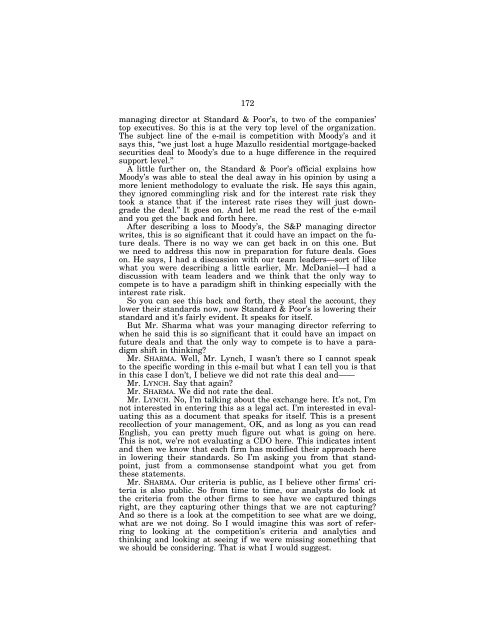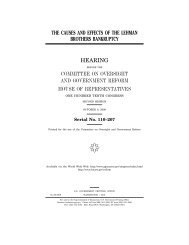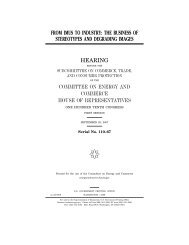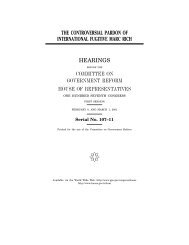CREDIT RATING AGENCIES AND THE FINANCIAL CRISIS ...
CREDIT RATING AGENCIES AND THE FINANCIAL CRISIS ...
CREDIT RATING AGENCIES AND THE FINANCIAL CRISIS ...
- No tags were found...
Create successful ePaper yourself
Turn your PDF publications into a flip-book with our unique Google optimized e-Paper software.
172managing director at Standard & Poor’s, to two of the companies’top executives. So this is at the very top level of the organization.The subject line of the e-mail is competition with Moody’s and itsays this, ‘‘we just lost a huge Mazullo residential mortgage-backedsecurities deal to Moody’s due to a huge difference in the requiredsupport level.’’A little further on, the Standard & Poor’s official explains howMoody’s was able to steal the deal away in his opinion by using amore lenient methodology to evaluate the risk. He says this again,they ignored commingling risk and for the interest rate risk theytook a stance that if the interest rate rises they will just downgradethe deal.’’ It goes on. And let me read the rest of the e-mailand you get the back and forth here.After describing a loss to Moody’s, the S&P managing directorwrites, this is so significant that it could have an impact on the futuredeals. There is no way we can get back in on this one. Butwe need to address this now in preparation for future deals. Goeson. He says, I had a discussion with our team leaders—sort of likewhat you were describing a little earlier, Mr. McDaniel—I had adiscussion with team leaders and we think that the only way tocompete is to have a paradigm shift in thinking especially with theinterest rate risk.So you can see this back and forth, they steal the account, theylower their standards now, now Standard & Poor’s is lowering theirstandard and it’s fairly evident. It speaks for itself.But Mr. Sharma what was your managing director referring towhen he said this is so significant that it could have an impact onfuture deals and that the only way to compete is to have a paradigmshift in thinking?Mr. SHARMA. Well, Mr. Lynch, I wasn’t there so I cannot speakto the specific wording in this e-mail but what I can tell you is thatin this case I don’t, I believe we did not rate this deal and——Mr. LYNCH. Say that again?Mr. SHARMA. We did not rate the deal.Mr. LYNCH. No, I’m talking about the exchange here. It’s not, I’mnot interested in entering this as a legal act. I’m interested in evaluatingthis as a document that speaks for itself. This is a presentrecollection of your management, OK, and as long as you can readEnglish, you can pretty much figure out what is going on here.This is not, we’re not evaluating a CDO here. This indicates intentand then we know that each firm has modified their approach herein lowering their standards. So I’m asking you from that standpoint,just from a commonsense standpoint what you get fromthese statements.Mr. SHARMA. Our criteria is public, as I believe other firms’ criteriais also public. So from time to time, our analysts do look atthe criteria from the other firms to see have we captured thingsright, are they capturing other things that we are not capturing?And so there is a look at the competition to see what are we doing,what are we not doing. So I would imagine this was sort of referringto looking at the competition’s criteria and analytics andthinking and looking at seeing if we were missing something thatwe should be considering. That is what I would suggest.VerDate 11-MAY-2000 12:35 Aug 24, 2009 Jkt 000000 PO 00000 Frm 00176 Fmt 6633 Sfmt 6633 U:\DOCS\51103.TXT KATIE PsN: KATIE








